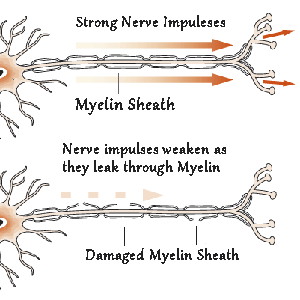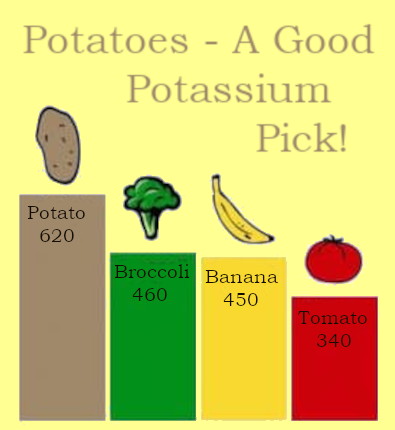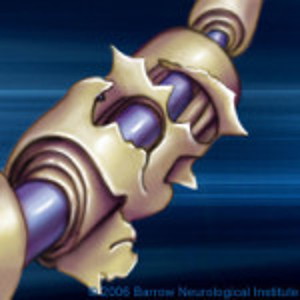
MS is characterized by damage to the myelin sheath which is supposed to surround our nerves, protecting them and keeping the impulses they send intact.
What happens when the protective sheath is damaged?
Any number of health issues can appear, one of which is MS. This, however, is pretty mind blowing: in an article about under diagnosed B12 Deficiency, people who had been thought to have MS, recovered when given vitamin B12.
And then, there’s potassium
While I have nerve damage from a central nervous system disease as well as from a long period of “profound” B12 deficiency, my experience with low vitamin B12 looked a lot like MS. It seems the two, low B12 and MS, have things in common…
In my case, a pipe broke. While waiting for the plumber I furiously swept gushing water out the front door, hoping to protect the rest of my home. When the plumber arrived he said he’d followed water flowing in the gutter to my house.
Some days later I was in a huge building with no place to sit and rest for a rather long distance. Within a few days of exhaustion from the leak and the long walk, I could barely walk at all, or stand. I ordered a cane, then before I used the cane, I ordered a rolling walker.
I thought I’d get better if I used more B12, but I didn’t get better. Instead it became difficult to lift my feet. I had to give up putting on nylons to go out. I thought if I lost weight, it would be easier to walk. As it was, it was so painful to stand up, to walk, to engage in almost any movement, that giving up going to the kitchen for food was easy.
I lost weight, but it didn’t make it easier to lift my feet. And, I’d begun to shake, especially after I’d gotten the mail and had to step up the 5 inch rise to come back into my house.
Whereas I’d been able to go to the grocery store on and again, it was no longer possible to get into my friend’s pickup. I didn’t have the strength.
I thought about going to a doctor, but felt sure I’d be told something scary, like that I had MS, and since the consensus is there’s no cure for MS, I decided there was no point in getting a scary opinion that could make it harder to keep positive and recover.
For a year my health deteriorated. I wondered how long I’d be able to take care of myself. Then I tore a muscle ~ more pain when I could barely handle what I already had.
I doubled my B12 intake to the equivalent of two B12 shots a day, and almost immediately extremely painful muscle spasms hit.
I was pretty sure I’d overdone my cobalt intake ~ B12 contains the heavy metal cobalt.
When I tweeted about my problem someone replied that using B12 can cause muscle spasms if there’s not enough potassium to keep up with your blood cells’ need for potassium as they divide more actively in response to more vitamin B12.
What a revelation that was!
We need 4700 mg of potassium a day
The revelation set me to reading scads of research articles and forum contributions related to potassium, all of which convinced me to try more potassium. Especially given that I had no idea we need 4700 mg of potassium a day. I mean, I was getting a small fraction of that.
At the time my meals were delivered by Kitchen Angels because I couldn’t stand long enough to cook. Recipients were given wonderful meals that included a banana once ever week or so. The same was true of potatoes. So I ordered potassium capsules, failing to work out that if each capsule was 98 mg I’d need to take most of the bottle in one day.

Since potassium capsules weren’t going to work, I researched foods rich in potassium. I ordered peanut butter to have for breakfast and lunch, and Maca to put in my coffee. Come spring I ordered seed potatoes and grew potatoes that were the most tasty I’ve ever had. And, I used cilantro capsules to reduce heavy metals in my body.
Within a few weeks I had fewer excruciating muscle spasms that felt as if my whole torso was going to seize up in a fearful, frozen permanence.
That was great, but even better, my strength was returning. It had been almost impossible to stand without holding on to my walker, which made it hard to do things that required one of my hands. To my great joy, as time went on and I continued to eat more potassium rich foods every day, my strength returned.
Months later I was so much better I could imagine walking without a walker.
Nerve Damage

Tattered myelin sheath is a common form of nerve damage and can cause intense pain.
![]() Methylcobalamin lozenges help you have healthy nerves and blood
Methylcobalamin lozenges help you have healthy nerves and blood
As long as your nerves are healthy the only pain you associate with them involves their rightful work, like telling you you’ve hit your thumb with a hammer. So, it comes as a shock if your nerves suddenly transmit burning when you don’t have any sunburn.
The tattering, known as demyelination, is loss of or damage to the protective sheaths on your nerves, generally resulting from low vitamin B12 levels. Without the protective myelin sheath your nerves may give you years of pain burning away the joy you once knew.
Additionally, when the myelin sheath is damaged it no longer keeps nerve impulses on the straight and narrow, so to speak. They slip out, losing some of their strength. It is not surprising, then, that the most common symptom of motor nerve damage is weakness.
Other symptoms
Other symptoms are painful cramps, muscle twitching visible under the skin, muscle loss, bone degeneration, and changes in skin, hair, and nails. In fact, your fingernails are an easy way to check the health of your nerves. Read more.
Sensory nerve damage causes more complex symptoms than motor nerve damage because your sensory nerves have a wider, more highly specialized range of functions like registering vibration, light touch, and position sense.
Damage to your sensory fibers lessens your ability to feel vibrations and touch, resulting in numbness, especially in your hands and feet. You may feel as if you’re wearing gloves and stockings even when you’re not. You may lose the ability to identify small objects by touch.
Damage to your sensory fibers also contributes to loss of reflexes (as can motor nerve damage). Loss of your sense of position can make it hard to coordinate complex movements like walking, or keeping your balance when your eyes are shut (like in the shower when you’re washing your hair).
Pain, in particular
Neuropathic pain following nerve damage is difficult to control and can seriously affect your emotional well-being and overall quality of life. Neuropathic pain is often worse at night, disrupting sleep and adding to the emotional overload of sensory nerve damage.
Just to be clear, there are very small sensory nerve fibers without myelin sheathing that transmit pain and temperature sensations. Damage to these nerves interferes with feeling pain or temperature changes. For instance, you may not feel an injury or that a wound is becoming infected. You may not notice that your feet are becoming cold, with the result that suddenly they are painfully cold. Or, you may not feel pains that could warn you of an impending heart attack.
Loss of pain sensation is particularly serious if you have diabetes. For instance, if you can’t feel pain you may not notice something that must be attended to or risk amputation.
Because of loss of pain sensation there is a high rate of lower limb amputations among people with diabetes.
On the other hand, pain receptors in your skin can become so sensitive you feel severe pain from the weight of a sheet or clothing.
The moral is, keep your B12 levels healthy and high and support them by eating foods rich in potassium. Remember you and your nerves need 4700 mg of potassium a day.
